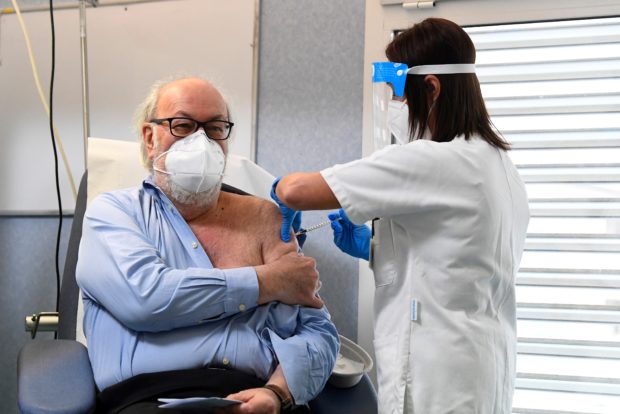EU begins vaccinations to end COVID-19 ‘nightmare’

Doctor Massimo Vajani, President of the Medical Association of the province of Lodi, receives one of the firsts doses of the Pfizer-BioNTech Covid-19 vaccine at Civico hospital, in Codogno, northern Italy, on December 27, 2020, where the country’s first patient was diagnosed. (Photo by FLAVIO LO SCALZO / POOL / AFP)
PARIS, France – EU countries on Sunday embarked on a vaccination campaign to defeat the “nightmare” of COVID-19, with the first to be immunised expressing emotion after their jab and leaders hailing a milestone in the fight against the pandemic.
The vaccine is a glimmer of hope for a continent yearning for a return to normal from a pandemic that has killed 1.76 million people worldwide since emerging in China late last year and caused at least 80 million confirmed cases, according to an AFP tally.
But polls have shown many Europeans are unwilling to take the vaccine, which could impede its effectiveness in beating the virus, while it will take months for large chunks of the population to be immunised.
“It is with deep pride and a deep sense of responsibility that I got the vaccine today. A small gesture but a fundamental gesture for all of us,” said Claudia Alivernini, 29, an Italian nurse who was the first in her country to receive the Pfizer-BioNTech jab Sunday morning.
In Greece, the first in line was nurse Efstathia Kampissiouli who flashed a V-sign while being vaccinated and later told Ert TV it was “a great honour for me but also for those working on the front line.”
Article continues after this advertisementEuropean Commission chief Ursula von der Leyen hailed the campaign start as a “touching moment of unity and a European success story”, adding the process will “help to get our normal lives back gradually.”
Article continues after this advertisementCountries are however showing different strategies, with Italy focusing on health workers, France the elderly and in the Czech Republic, Greece and Slovakia political leaders at the front of the queue.
– Things ‘might actually get worse’ –
But the introduction of the vaccine worldwide is far from the end of the crisis. In a bleak assessment, top US government scientist Anthony Fauci warned Sunday that “as we get into the next few weeks, it might actually get worse”.
Israel on Sunday began a nationwide two-week lockdown — its third since the pandemic started — after a sharp rebound in the infection rate.
A new strain of the virus that emerged in Britain has already reached several other European countries as well as Japan, Canada and Jordan and intensified fears of more Covid-19 havoc to come.
The new strain — which experts believe is more contagious — prompted more than 50 countries to impose travel restrictions on the UK.
Echoing concerns from officials across the continent, Health Minister Olivier Veran said France has not ruled out imposing a third nationwide lockdown if coronavirus cases continue to rise after the holiday season.
He said it would become clear in the next months if the vaccine might not just stop people falling sick but also prevent the virus from being passed on.
“This would allow us to leave this nightmare quicker,” he said.
– ‘Felt nothing’ –
Some EU countries began vaccinating on Saturday, a day before the official start, with a 101-year-old woman in a care home becoming the first person in Germany to be inoculated and Hungary and Slovakia also handing out their first shots.
Araceli Rosario Hidalgo Sanchez, a 96-year-old living in a care home in central Spain became the first person in the country to be vaccinated on Sunday, in an event broadcast by national television. She said smilingly she felt “nothing” from the shot.
France began its campaign in care homes for the elderly in the Paris suburb of Seine-Saint-Denis, a low-income area hard hit by Covid-19, with a 78-year-old woman named Mauricette the first to receive the jab to applause from staff.
“We have a new weapon against the virus — the vaccine,” tweeted President Emmanuel Macron.
But a poll published in the Journal du Dimanche saying 56 percent of French people do not plan to take the jab.
Swedish Prime Minister Stefan Lofven described the vaccine as a “ray of light in the darkness”. One of the first Swedes to get the vaccine, Stig Larsson, 89, said he “did not hesitate” about being inoculated.
– ‘Winning formula’ –
Britain, China, Russia, Canada, the United States, Switzerland, Serbia, Singapore and Saudi Arabia have already begun their vaccination campaigns.
Vaccines other than the Pfizer-BioNTech jab are also in the pipeline, and the United States, where over a million people have already been vaccinated, last week began jabs with the vaccine developed by US biotech firm Moderna.
Meanwhile the University of Oxford and drug manufacturer AstraZeneca have applied to the UK authorities for permission to roll out their Covid-19 vaccine, which chief executive Pascal Soriot described as a “winning formula”.
gsg
For more news about the novel coronavirus click here.
What you need to know about Coronavirus.
For more information on COVID-19, call the DOH Hotline: (02) 86517800 local 1149/1150.
The Inquirer Foundation supports our healthcare frontliners and is still accepting cash donations to be deposited at Banco de Oro (BDO) current account #007960018860 or donate through PayMaya using this link.